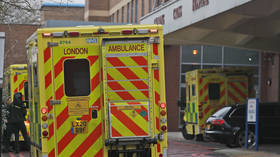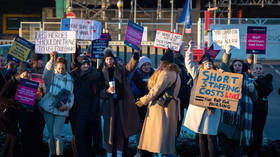Brits urged to be cautious with ambulance calls

UK Health Minister Will Quince has urged the public to avoid calling an ambulance on Wednesday unless facing a “life-threatening situation,” as ambulance workers prepare to strike. Britain’s National Health Service (NHS) is already reeling from two nurses’ walkouts in less than a week.
Appearing on the BBC on Tuesday, Quince said that people suffering chest pains or other serious conditions could still expect some cover, but others should call the NHS’ non-emergency line instead.
“Where people are planning any risky activity, I would strongly encourage them not to do so because there will be disruption on the day,” Quince said, without specifying what he considered “risky activity.”
Negotiations over exactly which cases drivers will respond to are ongoing, The Guardian reported.
Nine ambulance trusts across England and Wales will strike on Wednesday, with the industrial action involving paramedics, dispatchers, and support workers. The planned disruptions will be the largest ambulance strikes to hit the UK since the 1980s, and NHS bosses have already instructed hospitals to free up beds and ensure ambulance patients are handed over within 15 minutes of arrival so that those few crews operating can respond to more calls.
The ambulance strike was preceded by a strike on Tuesday involving more than 10,000 nurses, the largest in the health service’s 74-year history. A similar nurses’ walkout last Thursday led to the rescheduling of 16,000 appointments and surgeries, according to NHS figures.
The nurses argue that recent pay rises haven’t kept pace with Britain’s soaring inflation rate, and are demanding a 19% hike in their wages. Prime Minister Rishi Sunak told the Daily Mail on Tuesday that he “won’t back down” in the face of such “unreasonable” demands. Sunak declared last Thursday that a pay rise of just 4.5% for most nurses was “fair and reasonable.”
Meanwhile, rail workers, postal workers and Border Force officers have all planned strikes this week.













